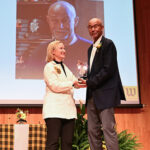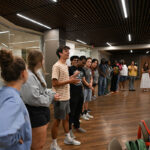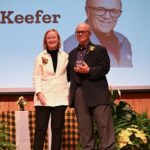
Music major draws from historical lows to hit musical highs in a soulful self-designed recital
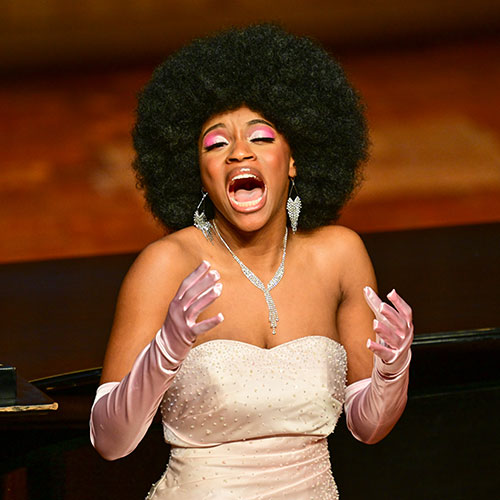
For vocal music majors, completing a senior recital as part of an Independent Study at The College of Wooster is the culmination of years of training and months of rehearsal for what is a truly special day. Bri Mosley’s performance was certainly in tune with these achievements, but it also jumped up an octave when it became a featured event on the College’s Black History Month celebration schedule and garnered the attendance of an Oscar-nominated songwriter. But perhaps the most meaningful achievements came from personal discoveries Mosley made about her own identity.
“I’ve struggled throughout my entire life to present myself openly and honestly, without caring what other people think,” Mosley admitted. “I live in a world that is pretty adverse and not always accepting of who I am—whether that be my race, my sexuality, or my identity as a woman. It was so important to me to perform music that allowed me to express this.”
She conceived a recital featuring five sets of songs that detailed varying aspects of Black joy. With a rich-textured and wide-ranging voice, Mosley delivered selections by historic Black musicians like Billie Holiday, Nina Simone, and Sam Cooke, among others. The result seamlessly spanned jazz, theater, R&B, and other genres to illustrate how Black joy is not without struggle and about reclaiming bodies, seeking change, retold stories, and one’s own story.
Having grown up in history classes focused most on slavery, Mosley realized she missed an education from so many Black voices that are important to understanding Black beauty and perseverance. “This project helped me learn about the significance of music in my own family, but it also taught me how Black people have used music as a way to document the progression of the Civil Rights Movement, discuss misrepresentation in the media, and how they’ve reclaimed their own identities to project their own authenticity.”
While she wasn’t required to submit a paper, Mosley wanted to pay proper tribute to these performers and took a more self-designed approach, completing written research that explains each piece’s relevance and historical context. “You cannot sing what you do not know. I had to know much about all of these different artists and their repertoire, and specifically these songs, so that when I came out on the stage, I would feel like I was doing them justice,” Mosley said.
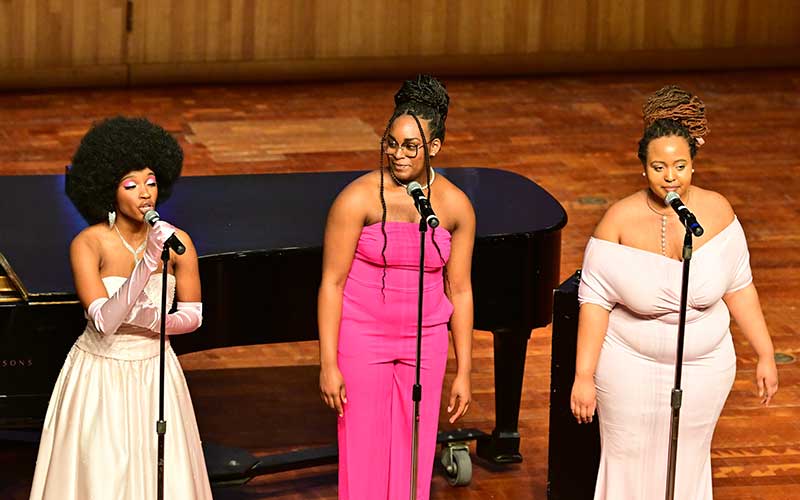
Mosley relied on the collaborative music community at Wooster as she completed her senior Independent Study project.
Between songs, Mosley drew from this research for a multimedia lecture of sorts that replaced typical recital program notes. She also provided a reflection of why each set of music and that aspect of Black joy is important to her. This allowed her to tap into aspects of production, performance, and music business that she enjoys. It also gave her the space to share personal experiences with her upbringing, racism, and more.
“When I arrived at college and was surrounded by a larger, more assertive community, I was reminded of the power of my memories and my right to feel anger,” said Mosley. “Performing this recital was not only an act of gratitude toward the students who helped lift me up, but to reveal to younger Black students how essential it is to rely on your community.”
She also relied on the collaborative musical community at Wooster to prepare her I.S. and perform with her. Lauren Vanden Broeck ’15, alumna and adjunct professor of music, mentored Mosley from a performance aspect, while Timothy Freeze, visiting assistant professor of music, offered music ethnography knowledge to mentor her research efforts. Two accompanists performed in the recital with Mosley, too. Toni Shreve, staff collaborative pianist, played during Mosley’s Wooster audition at age 17 and has been with her for all four years at Wooster. “She’s very much one of the most important people who defined my experience here,” Mosley said fondly. Adjunct Instructor of Music and Jazz Combo Coach Greg Slawson also played an integral role providing accompaniment and recruiting student instrumentalists for the recital.
“The work of uncovering ancestral trauma, recovering one’s cultural inheritance, and discovering one’s place in the world is a monumental undertaking for one student to do essentially on her own. And I am so grateful that Bri wasn’t entirely on her own,” said Vanden Broeck. “This project was the definition of community.”
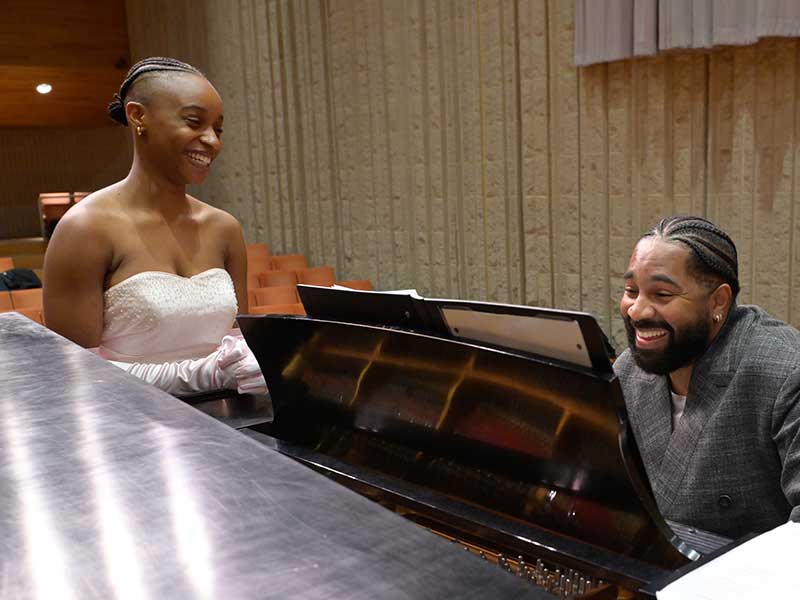
Oscar-nominated song writer and alumnus Darius Scott Dixson ’13 returned to campus to coach Mosley in performing “Be Alive,” the 2022 best original song nominee.
And that community extends far beyond campus. Mosley unknowingly chose to perform “Be Alive,” a song written by one of Vanden Broeck’s former Wooster classmates, Darius Scott Dixson ’13. “DIXSON” (as he’s known professionally) and Beyoncé Knowles-Carter received an Oscar nomination in the Best Original Song category for the music and lyrics to “Be Alive” from the motion picture King Richard.
Vanden Broeck asked if DIXSON would like to offer any technical training for Mosley and her ensemble, and he enthusiastically arranged a virtual session to give a few notes the week before the performance. What’s more: He came to work one-on-one with Mosley at the dress rehearsal and attended her recital. “Having Darius with us to put the final touches on Bri’s repertoire was indispensable,” said Vanden Broeck, acknowledging his knowledge of gospel and R&B music idioms.
Mosley described working with DIXSON as one of the most meaningful interactions she could have had in that process. “It was a very surreal experience! He was so down to earth. He gave me really great things to think about, and they really did impact the performance,” she said.
After Wooster, Mosley plans to keep studying music performance, and she emphasizes the need for society to keep learning about musical traditions and history of Blackness in America and the world. “It will disappear if we let it,” urged Mosley. “Many Black musicians have been erased thus far, and if we continue to let that happen we’re contributing to the erasure of a culture that has brought so much to the world we have today.”
This feature originally appeared in the Summer 2024 issue of Wooster magazine.
Posted in Independent Study, Magazine on July 11, 2024.
Related Posts
Related Areas of Study
Music
Earn a bachelor of arts in music or a bachelor of music in either music performance or music composition
Major MinorAfricana Studies
An interdisciplinary approach to interpreting the lives and experiences of the world's Black women and men.
Major Minor
